Ashlian
Ashlian is a language only in use in Aberravinor and in the Kingdom of Ashtree. Where the kingdom is now, there used to be tribes of humans known as Ashlians, and their own ancient form of this language (though it may seem archaic and incomprehensible today) is thought to be the precursor to most modern languages. It is the most common language in Ashtree, and most demihumans know it, too, unless they grew up in a town where they were the majority. It is a language where words flow very easily, with simple grammar and pronunciation. There are many different dialects and accents now that it has spread far.
Writing System
It uses what we would call the Latin Alphabet, but the pronunciation is a vague combination of German and Old Norse.
Syntax
Indirect articles don't exist in Ashlian, while direct articles only come in the form of a general word that would be an analogue to "the." This word, specifically, is "er." Possessive pronouns also don't exist as their own part of speech, and instead, an indicator is placed at the beginning of the noun that is in posession. Adverbs aren't really their own thing, but rather, adjectives and adverbs are interchangeable. If the descriptive is placed before the predicate, it becomes an adverb and affects the predicate. If it is placed after the predicate and before the subject, it becomes an adjective and affects the subject. Conjugation doesn't exist in Ashlian, either, and infinitives are differentiated by the word "ha" being attached to their beginning. Essentially, one wouldn't say "see you at my house," but rather something like "meet each other my house." It obviously isn't grammatically correct in our language, but hopefully, this helps you understand the way sentences are structured a bit more. Lastly, ending a word with "am" or "em" usually means it's the plural form. As always, there are plenty of irregular words in the language that don't follow the aforementioned rules.
Phonetics
"å" is a hard, short "a" sound if it were pronouced somewhat like the word "oar." The regular "a" is a hard and long "ah" sound, though if it is in the middle of a word and is preceded and followed by a consonant, it could sound more like the "æ" sound. To prevent misconceptions, modern versions of some words are spelled with the letter æ in them. Whenever there is a "j," it is pronounced like an English "y," as in "yes." The actual letter "y" sounds somewhat like the "u" in "tune." The letters "ie" are pronounced as "ee," though "ei" is pronounced as "I" (the first person pronoun). The letter "ø" is spoken like a mix between the "i" in "bird" and an "oo" sound. Regular i's are pronounced as "ee," and u's are pronounced as a straight "oo" sound.
"Hv" is pronounced like a "hw," and "w" is pronounced as a "v" (like in the word voyage). R's are all rolled, and "Kh" is pronounced like a fricative and velar "x," meaning both "x" and "kh" are hoarse and h-sounding, like if the word "hoard" were pronounced with a raspy voice. F's are pronounced the same way as v's, unless they are at the start of a word, in which case they are pronounced as an "f" in English. Z's are pronounced as "ts," and an "s" followed by a "t" indicates a "sh" sound at the beginning.
Tenses
Changing tenses in verbs is usually very easy, as specific conjugation doesn't exist. There is also no continuous tense, since there is no differentiation between continuous and immediate actions. As a rule of thumb, simple past (preterite) is done by adding on "en" to the end of a word. Perfect past is usually done by adding on "eren" to the end of a word. Future tense is designated by the usage of "kher en" before a word, which would be similar to "going to" or "will" in our language. Some verbs can only be used in specific tenses, such as "grost," which means "meet again." You obviously can't use it anywhere besides future tense, unless you're saying "met again," in which case you would change it to "grosten." Over all, no matter the tense, verbs are always simple. The phrase "grost evaun" literally means "meet again each other," but one can gather a full meaning from that sentence either way.
Sentence Structure
Predicates come right before their subjects, no matter the context. This goes for infinitive verbs, too, as they are placed after the main verb and before any adjectives preceding the subject. Prepositions don't typically exist as a part of speech, rather being woven into the general intonation of a sentence. If a direction must be specified, it's included as part of a noun, though the prefix can be said separately from the noun to give a direction. Indirect and direct objects come last, in that order.
Dictionary
Spoken by
Common Phrases
Håb jabt Nontellok bæwm. "May Nontellok bless you."
Kher ång! "Damn it!" or an equivalent curse.
Grost evaun. "We'll meet again/see you later." In Ashlian culture, close friends might specify their next presumed meeting location. For example, "grost evaun siebeln" means "see you in the dining hall."
Seberen il lazam. "I have seen the truth." A direct article is not needed, since "truth" (lazam) is more of an abstract concept in this phrase.



Comments